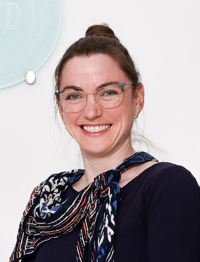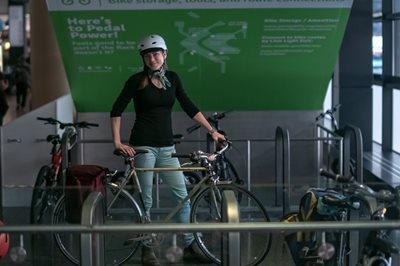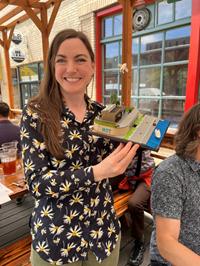Building Sustainability for Fishing, Fleets & Freight

Jessica Brown
Sustainability Environmental Program Manager, Port of Seattle
From bike lanes to waterways, Jessica Brown considers what it takes to support sustainable transportation for visitors, employees and tenants of the Port of Seattle. Since graduating with a civil engineering degree from UW’s Online Master in Sustainable Transportation in 2022, Jessica has been able to pivot from a career in hydrogeology to a new focus on transportation — earning a job promotion along the way.
“Now I’m leading a sustainability effort,” Jessica says. “I get to focus on something I’m really passionate about.”
Here, Jessica shares how this UW master’s program can be truly transformational, and why it’s a smart time for anyone to launch a career in sustainability.
How did you get interested in sustainable transportation?
My interest really started when I was a teenager living in Federal Way. Transit was always an important way for me to access higher paying jobs in the city. I walked along the shoulder of busy roads that didn’t have sidewalks, and when I was taking the bus, I rode an hour each way to get downtown.
Tell us about your work for the Port of Seattle.
I’m an environmental program manager for the Port’s Maritime Environmental and Sustainability team. My role is to assess alternatives as we incorporate sustainability and equity into capital programs and operations. I also work on sustainable ground transportation.
I lead what we call the sustainable evaluation framework. We work on a program’s cost-benefit analysis. With that information, it’s easier to weigh trade-offs and say, yes, we’re going to invest in this option because of the emission reduction, or the equity component.
How do you use your UW degree in your work?
One recent example is that I was able to articulate the benefit of adding a direct sewage discharge line at one of our fishing berths. That doesn't sound very interesting at all until you dig into the details!
In the past, sewage pumped from ships was stored in tanks on site, then large diesel trucks would cart that off for disposal. Not only does the direct discharge line save money for our fishing-fleet tenants, it clears those tanks offsite for more usable space, eliminates many tons of greenhouse gas emissions from the trucks, and reduces pollutants impacting our overburdened near-port communities.
That’s just one small example of something that I probably wouldn't have had the skills to do without my time in the MST program.

Why did you choose the UW Online Master of Sustainable Transportation?
I was a mid-career professional working in the environmental field, but I wanted to change the focus of my work toward transportation. I couldn't quit my job to be a full-time student.
This program offered the academic rigor you expect from the University of Washington, but on a schedule that could fit my life — I could keep my full-time job, earn a master’s degree and move up in my career.
Tell us about your experience as a part-time, online student.
Learning online was seamless — it was easy to access from wherever I was. My instructors brought a wealth of experience from different areas, such as freight transportation, planning, active transportation and community design.
And the online experience didn’t stop me from making friends. My cohort was all ages. Many of us were working professionals, and we got to exchange ideas in real time about how we were thinking about applying the course content.
What was it like going back to school as a working professional?
Going back to school was scary at first. I mean, I have kids, and a dog, and a family, and aging parents, and a full-time job. But just one class a week turned out to be very manageable. I could fit readings and papers around other life commitments. I didn’t see my friends very often, but I think it was worth it.
What kind of growth opportunities do you see in this field?
The career opportunities are going to be vast. Cities and organizations trying to meet climate goals are going to have to use a lot of different levers. Communities are investing in bike lanes, and they need designers. Projects in decarbonization and alternative fuels, such as electrification and hydrogen, are getting a lot of federal investment and local attention.
These skillsets are in demand like never before, so it’s a good time to get in this degree program and pivot your career.

What do you want future students to know about the UW Online Master of Sustainable Transportation?
You really do get out of the program what you put into it.
I looked at the MST program for years before applying. I was sure I was going to be rejected. I had a hard time personally in my last year of undergrad, and my grades didn't meet all the admission requirements. But that was years ago, so I did apply. I wasn’t matriculated at first, but I earned grades that were good enough to stay in the program and ended up being awarded 2022 Student of the Year.
I want other students who feel like they’re not good enough to look beyond whatever is holding them back. Give yourself a chance — it’s never too late.